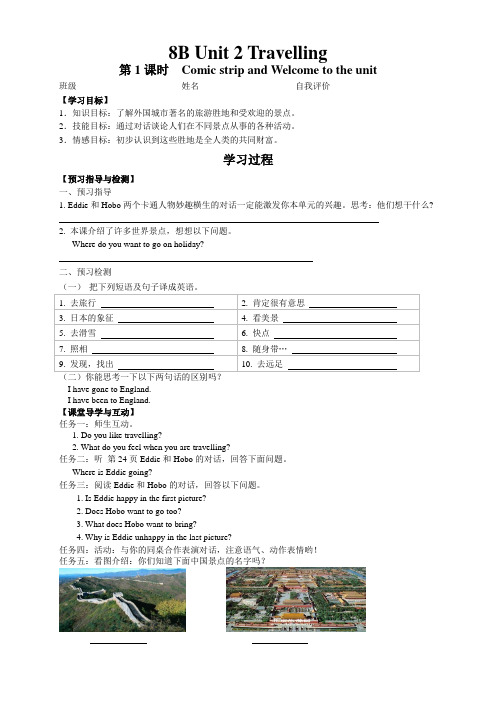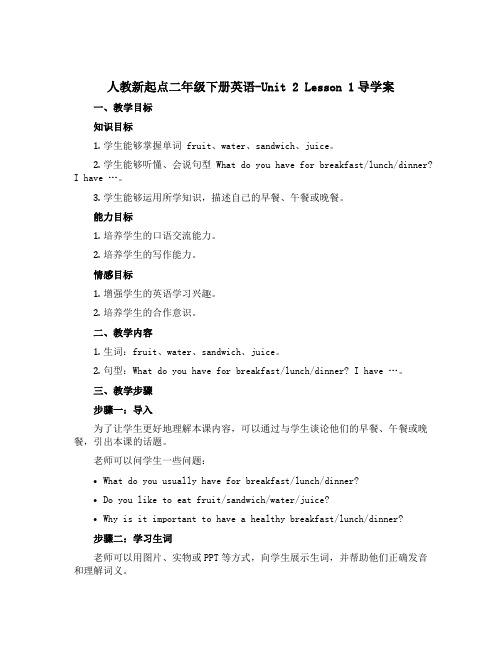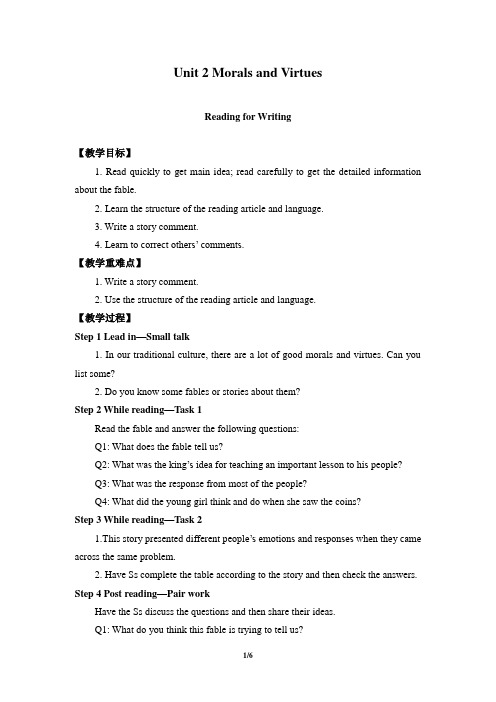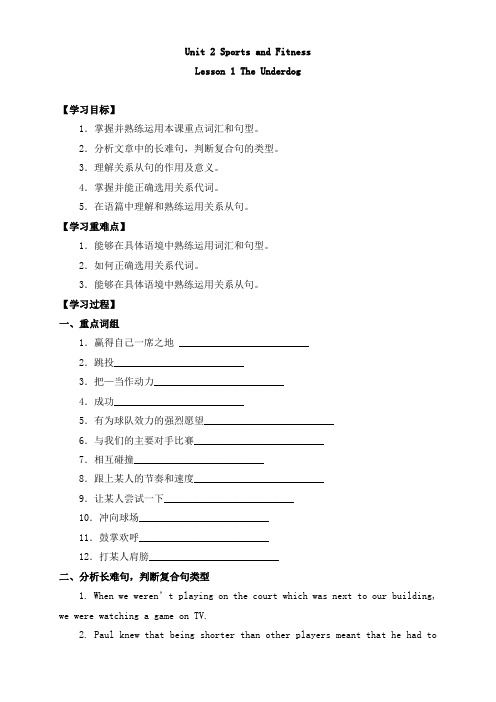Unit2导学案-1
八年级下Unit2 SectionB1a-1e, Self Check导学案

Unit2 I’ll help to clean up the city parks.导学案SectionB1a-1e, Self Check (第三课时)学习目标1.进一步掌握谈论提供帮助的句型。
2.听力训练,能听懂所说的动词短语。
学习重点:听力训练,能听懂所说的动词短语。
学习难点:掌握动词短语和动词不定式。
自主先学:1.根据汉语写出下列英语单词或短语并展示.1)与......相像;像_______________ 2)用完,用光_______________3)修理;修补;解决______________4)与……相似_______________5)赠送_______________要点分析:1.repair vt.“修理,修缮”。
如:They are repairing their house.他们正在修缮房屋。
辨析:fix up, repair与mendfix up, repair与mend都有“修理,修补”之意,有时可以通用,但也有区别。
(1)repair和fix都表示使受到一定损坏或失灵的东西恢复其性能或机能,其对象范围很广,从道路、机器到日常用品,如:repair/fix a machine/road(2)mend表示修补破损的东西,使其恢复原样,一般指较小的物品。
如:mend the window/sock2.take after“与(父母)相似”,指由于血缘关系而(在外貌、性格等方面)相似。
如:Tom takes after his father.汤姆像他父亲同义词look like,多指外貌方面相似。
如: Tom looks like his father.汤姆长得像他父亲similar adj.相似的,be similar to与……相似。
如:Cats and tigers have similar features.猫和虎有类似的特征。
A cat is similar to a tiger in many ways.猫和虎有好多方面的相似。
Unit 2 How often do you exercise.doc 导学案

Unit 2 How often do you exercise? Section B 1a-1e导学案第一步:温故知新(3分钟)1、根据句意和首字母提示补全单词,使句子完整、通顺。
(1)、I often surf the I__________ on weekends.(2)、You had better take the medicine t___________ a day.(3)、——What's your favorite TV p__________?——sports news(4)、——How often do you go to the movies?——o__________ a week(5)、The bottle is f__________ of water.2、根据汉语意思完成英语句子,没空一词。
(1)、Tom ______ ______ (几乎从不)watches TV.(2)、They _______ _____ ___________ ___________(正在忙着植树)(3)、John and his friend play football ________ __________(至少)once a week (4)、——How often do you have art lessons?——______ _______ __________(一周两次)(5)、Our teachers usually ____ _______(熬夜)late to work.第二步:明确目标(2分钟)1、.口、笔头掌握以下句型:A:How often do you drink milk? B: I drink milk every day .A: Do you like it ? B: No, but my mother wants me to drink it. She says it’s good for my health.A: How many hours do you sleep every night? B: I sleep six hours .2.熟练掌握以下词汇:milk, coffee, chocolate , drink, health.重难点:1.掌握并能正确使用本课时的重点短语:be good for2.能正确使用how many 对可数名词的复数提问。
8B Unit 2-1 Comic strip 导学案

8B Unit 2 Travelling第1课时Comic strip and Welcome to the unit班级____________________ 姓名__________________ 自我评价__________________【学习目标】1.知识目标:了解外国城市著名的旅游胜地和受欢迎的景点。
2.技能目标:通过对话谈论人们在不同景点从事的各种活动。
3.情感目标:初步认识到这些胜地是全人类的共同财富。
学习过程【预习指导与检测】一、预习指导1. Eddie和Hobo两个卡通人物妙趣横生的对话一定能激发你本单元的兴趣。
思考:他们想干什么?_______________2. 本课介绍了许多世界景点,想想以下问题。
Where do you want to go on holiday?_______________二、预习检测1. 去旅行2. 肯定很有意思3. 日本的象征4. 看美景5. 去滑雪6. 快点7. 照相8. 随身带…9. 发现,找出10. 去远足I have gone to England.I have been to England.【课堂导学与互动】任务一:师生互动。
1. Do you like travelling?2. What do you feel when you are travelling?任务二:听第24页Eddie和Hobo的对话,回答下面问题。
Where is Eddie going?任务三:阅读Eddie和Hobo的对话,回答以下问题。
1. Is Eddie happy in the first picture?2. Does Hobo want to go too?3. What does Hobo want to bring?4. Why is Eddie unhappy in the last picture?任务四:活动:与你的同桌合作表演对话,注意语气、动作表情哟!任务五:看图介绍:你们知道下面中国景点的名字吗?任务六:看一看写一写,完成第25页Part A部分练习并与你的同桌核对答案。
人教新起点二年级下册英语-Unit 2 Lesson 1导学案

人教新起点二年级下册英语-Unit 2 Lesson 1导学案一、教学目标知识目标1.学生能够掌握单词 fruit、water、sandwich、juice。
2.学生能够听懂、会说句型 What do you have for breakfast/lunch/dinner?I have …。
3.学生能够运用所学知识,描述自己的早餐、午餐或晚餐。
能力目标1.培养学生的口语交流能力。
2.培养学生的写作能力。
情感目标1.增强学生的英语学习兴趣。
2.培养学生的合作意识。
二、教学内容1.生词:fruit、water、sandwich、juice。
2.句型:What do you have for breakfast/lunch/dinner? I have …。
三、教学步骤步骤一:导入为了让学生更好地理解本课内容,可以通过与学生谈论他们的早餐、午餐或晚餐,引出本课的话题。
老师可以问学生一些问题:•What do you usually have for breakfast/lunch/dinner?•Do you like to eat fruit/sandwich/water/juice?•Why is it important to have a healthy breakfast/lunch/dinner?步骤二:学习生词老师可以用图片、实物或PPT等方式,向学生展示生词,并帮助他们正确发音和理解词义。
1.fruit:水果2.water:水3.sandwich:三明治4.juice:果汁步骤三:学习句型1.What do you have for breakfast?(你早餐吃什么?)2.What do you have for lunch?(你午餐吃什么?)3.What do you have for dinner?(你晚餐吃什么?)4.I have …(我吃…)老师可以用图片或实物,向学生展示早餐、午餐或晚餐的食物,让学生用所学的句型描述自己的餐点。
人教版英语八年级上册 Unit 2 Section A(1a-2e)导学案 (含答案)

人教版英语八年级上册第二单元Unit 2 How often do you exercise?Section A (1a-2d)导学案一、预习目标:1、单词:学习这两页的生词。
2、短语过关:学习关于“做某事的频率”的相关短语。
3、语法:频率副词usually\ often\ sometimes \ never\ hardly ever等。
4、句子过关:How often do you exercise? 你多久锻炼一次?\ I often watch TV. 我经常看电视。
\ I never go shopping. 我从不购物。
\ I watch TV every day. 我每天看电视。
5、积累有关书面表达的句子。
预习导学。
(一)、单词突破——根据下面的提示,写出下列单词的意思。
1、housework ____________2、hardly____________3、ever____________4、hardly ever____________5、once_____________6、twice______________7、Internet_____________8、program_____________9、full________________ 10、swing_____________ 11、swing dance ________________单词讲解:1、housework家务劳动、家务事,不可数名词,常用短语do housework,表示“做家务劳动”。
2、hardly几乎不、几乎没有,表示否定。
3、ever在任何时候、从来、曾经,注意和never(绝不)相区别。
4、hardly ever几乎从不;例如:She hardly ever eats junk food. 她几乎从不吃垃圾食品。
5、once一次、曾经,表示次数;例如:once a month一个月一次。
6、twice两次、两倍,表示次数;例如:twice a year一年两次。
《Unit 2 Morals and Virtues Reading for Writing》教案(附导学案)1

Unit 2 Morals and VirtuesReading for Writing【教学目标】1. Read quickly to get main idea; read carefully to get the detailed information about the fable.2. Learn the structure of the reading article and language.3. Write a story comment.4. Learn to correct others’ comments.【教学重难点】1. Write a story comment.2. Use the structure of the reading article and language.【教学过程】Step 1 Lead in—Small talk1. In our traditional culture, there are a lot of good morals and virtues. Can you list some?2. Do you know some fables or stories about them?Step 2 While reading—Task 1Read the fable and answer the following questions:Q1: What does the fable tell us?Q2: What was the king’s idea for teaching an important lesson to his people?Q3: What was the response from most of the people?Q4: What did the young girl think and do when she saw the coins?Step 3 While reading—Task 21.This story presented different pe ople’s emotions and responses when they came across the same problem.2. Have Ss complete the table according to the story and then check the answers. Step 4 Post reading—Pair workHave the Ss discuss the questions and then share their ideas.Q1: What do you think this fable is trying to tell us?Q2: Do you think the king was wise? Why or why not?Q3: Can you think of times in your own life when you felt and acted like the girl or like the other people in the story? Give examples.Step 5 Writing —The OutlineStep 6 WritingVocabulary1.寓言 fable2.等着作某事 wait to do sth./ wait for doing sth.3.负责任 take responsibility for/be responsible for4.成功作某事 succeed in doing sth./be successful in doing sth.5.因……让人印象深刻 have a deep impression on/ upon/ impress on/upon with sth.6.目的 purpose7.鉴于这一原因 for the reasonSentences1.这个寓言是一个关于一位国王古寓言。
高中英语必修第一册导学案Unit 2 Sports and Fitness Lesson 1 The Underdog-北师大版(2019)

Unit 2 Sports and FitnessLesson 1 The Underdog【学习目标】1.掌握并熟练运用本课重点词汇和句型。
2.分析文章中的长难句,判断复合句的类型。
3.理解关系从句的作用及意义。
4.掌握并能正确选用关系代词。
5.在语篇中理解和熟练运用关系从句。
【学习重难点】1.能够在具体语境中熟练运用词汇和句型。
2.如何正确选用关系代词。
3.能够在具体语境中熟练运用关系从句。
【学习过程】一、重点词组1.赢得自己一席之地 __________________________2.跳投__________________________3.把—当作动力__________________________4.成功__________________________5.有为球队效力的强烈愿望__________________________6.与我们的主要对手比赛__________________________7.相互碰撞__________________________8.跟上某人的节奏和速度__________________________9.让某人尝试一下__________________________10.冲向球场__________________________11.鼓掌欢呼__________________________12.打某人肩膀__________________________二、分析长难句,判断复合句类型1. When we weren’t playing on the court which was next to our building, we were watching a game on TV.2. Paul knew that being shorter than other players meant that he had topractise more.3. Paul’s favourite player was Tyrone Bogues, a guy who played for the Charlotte Hornets, although we actually agree that they are both champions.4. The Lions were playing our main competitors, The Bears, a team whose record this season had been perfect.5. He didn’t know he’d soon get the chance that he’d been waiting for.6. Everyone knew Paul had real skills, and was someone who worked really hard and had a strong desire to play for the team.7. And clearly, all the extra hours that he’d spent practising alone paid off.8. He was still usually on the bench, being just a replacement, which was really tough on him.9. Bogues was only 1.6 metres tall, which made him the shortest player ever in the NBA.三、重点词汇ever mean try out compete be tough on pay off1. ever 曾经;(与比较级连用,置于than之后或与最高级连用)比以往任何时候Have you ever visited the great wall?It’s raining harder than ever. 雨下得更大了the shortest player ever in the NBAThis is the best work that you have ever done.=This is your best work ever. 这是你所的最好的工作。
导学案Unit 2 I think that mooncakes are delicious! Section B1 (1a-1d)

Unit 2 I think that mooncakes are deliciousSection B1 (1a-1d)【学习目标】1.教会学生单词:haunted,ghost,trick,treat,spider2.教会学生通过听力训练获取有效信息,引导学生通过对西方节日的学习,体会西方节日的乐趣。
3.通过学习,了解万圣节的相关庆祝活动。
4. 过对圣诞节的了解,提高语言运用能力。
5. 理解圣诞节精神所在:向周围的人给予爱和送去欢乐。
【重点和难点】【学习重点】重点单词和短语:trick,treat,spider,dress up【学习难点】通过交流表达和听力训练,引导学生通过对西方节日的了解,体会西方节日的乐趣。
【课前预习】一.请根据中文意思写出下列重点单词。
1. 有鬼魂出没的;闹鬼的adj. __________2.花招;把戏n. __________3.款待;招待n.招待;请(客) v.__________二.请认真阅读课文,找出下列重点短语。
4.了解___________________5.装扮___________________三.请用以上重点短语完成下列句子。
6.——你已经了解到哪些有关万圣节前夕的知识?——噢,我知道它是北美的一个很受欢迎的节日,在10月31日。
—What have you_______ _______ Halloween?—Oh,I know it's a _______ _______ in North America and it's on October 31st. 7.——你最喜欢这个节日的什么?——我认为装扮成卡通人物很有趣!—What do you like _______ _______ _______ _______?—I think it's fun to _______ _______ as cartoon characters!四.阅读教材内容完成。
- 1、下载文档前请自行甄别文档内容的完整性,平台不提供额外的编辑、内容补充、找答案等附加服务。
- 2、"仅部分预览"的文档,不可在线预览部分如存在完整性等问题,可反馈申请退款(可完整预览的文档不适用该条件!)。
- 3、如文档侵犯您的权益,请联系客服反馈,我们会尽快为您处理(人工客服工作时间:9:00-18:30)。
3. He has met many wonderful people when he works at the hospital. (变为否定句)
He ___ _____ ______ many wonderful people when he works at the hospital.
【自主预习】
一、课标词汇聚焦:1Fra bibliotek请参照课本完成下列表格
单词
词义
词性
原句重现
cheer
sign
notice
lonely
several
strong
feeling
owner
journey
raise
alone
2.请任选4个词仿照原句造句。
__________________________________________________________________________________________________________________________________________
与前面的句子有什么共同的特点?
3.你的疑惑:________________________________________________________
【自我诊断】
I.句型转换。
1. He said that he had already run out of money for buying that car. (变为同义句)
We need to come up with a plan for the City Park Clean -up Day.
我们需要为城市公园清洁日想出一个计划。
◆= catch up with赶上追上
Let's go slowly so that they can come up with us.我们走慢点,好让他们赶上来。
He said that he had already ______ all his money ____ buying that car.
2. I’ll try my best to solve the problem if I really meet a difficult one. (对划线部分提问)
He made a journey to Beijing.他去北京旅行了。
注:journey有时并不指真正意义的“旅行”,而只是表示走过一段距离。如:
How long is your journey to work?你上班要走多远?
B.(心灵的)历程What is Yoga?A journey of the soul?瑜伽,是心灵之旅?
5. alone / lonely辨析:
◆alone = by oneself adj.单独的,指无人陪伴的客观事实,不带感情色彩。
He often walks alone to home .
◆lonely①指人孤独的,寂寞的,强调主观感受;
The old man feels lonely, so he raises a dog.
The only thing he cares about is money.他只在乎钱。
【拓展】care的短语总结take care =be careful v.当心,小心
take care of处理,做完
7. several可作定语,表示“几个”:= a few
Several boys were injured.有几个小伙子伤了。
2.掌握使用I could, I will, I would like to …向别人提供帮助的句型。
3.学会用I will, I could做规划,并掌握向别人提供帮助的一些动词短语。
4.通过本单元的任务活动,培养学生的合作精神以及学会关注社会,关心他人的精神。
【重点难点预测及解决方案】
1.学会表达如何向别人提供帮助;
宾语为代词用cheer sb. up cheer me up使我高兴
◆cheer on意思是“为…打气,激励…,向…喝彩”,是动副短语。
She did her best to cheer him on when he was about to give up.
4. come up with◆=think up想出
③give out ___________④come up with ____________
⑤put off ____________________⑥hand out _______________
⑦used to __________________⑧care for ___________________
2.规律总结:分析以上句子,你有何发现?
①这些都是用来表示________。
②结构:need后接_________,put off后接_________, let后接_________,.
③另一个句子:We could each call up 10 students and ask them tocome.
She volunteers there once a week to help kids learn to read.
I’m making some signs to put up around the school.
2.能使用情态动词could表达建议
You could ask hospital to let you visit the kids and cheer them up.
9. go on a journey = go on a trip去旅行
they’re going on a different journey with each new book
◆journey旅行;行程;历程,过程
A.通常指远距离的陆地旅行,(通常指单程)。
I wish you a pleasant journey.祝你一路顺风。
__________________________________________________________________________________________________________________________________________
1.翻译下列短语
①clean up____________________②cheer up ___________
10. at the same time同时,
I can do what I love to do and help others at the same time.
(二)语法学习
1.能分辨动词不定式在句中作宾语、补语和状语时的作用和意义,并能正确使用动词不等式。
I’d like to help homeless people.
学习并掌握下列短语:clean up, cheer up, give out, used to, come up with, oldpeople’s home, care for
重点掌握以下句型:(1)I’d like to help homeless people.
(2)You could ask hospitals to let you visit the kids and cheer them up.
I’ll have to work hard to come up with other classmates.
【拓展】v+up with构成的短语:catch up with赶上;追上keep up with跟上;跟…保持联系put up with容忍;忍得住end up with结束;以.......而结束
②Clean-Up Day is only 2 weeks from now. We can’t put off making a plan.
③We could put up signs.
④Let’s make some notices, too. Then I’ll hand them out after school.
◆比较:care about.对…担心;介意;关心
Don't you care about anybody?你难道谁也不关心吗?
Don't you care about losing your job?你难道不担心失去工作吗?
He does not care about his clothes.他对穿衣服不在乎。
◆with the help of在……帮助下。◆help sb. with sth.帮助某人做某事。
◆can’t help doing情不自禁做....
2. clean up把……打扫干净(v. + adv.)
◆clean up the table = clean the table up宾语为代词用clean sth. up
2.识记各种志愿活动应该干的事情并给出灵活给出建议;
3.使用英语与同学灵活、自由、更深层次地谈论关于志愿者的话题。
(一)词汇学习
1、help v →helpful◆help sb. to do sth.帮助某人做某事。
◆help oneself(to)自用(食物等)。
◆help sb. out帮助某人克服困难,渡过难关、解决问题、完成工作。
④_______________________________________________
三、语法探究:
1.观察思考:请体会以下句子中的意思。
①We need to come up with a plan to tell people about the city park clean-up.
